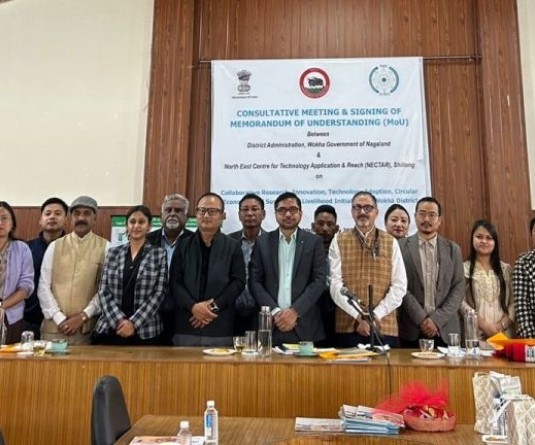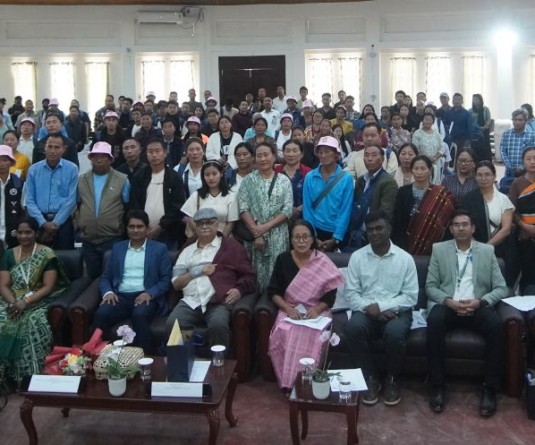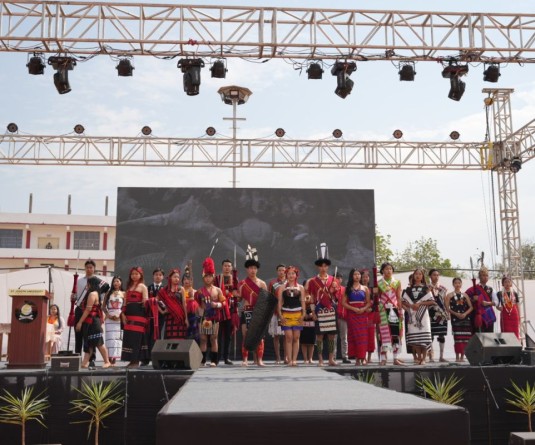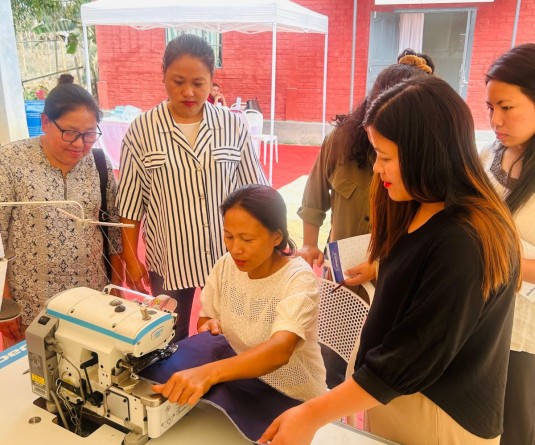NESO and NSF officials, with students, during the ‘Sit-in- strike’ in Kohima, on August 18. (Morung Photo)
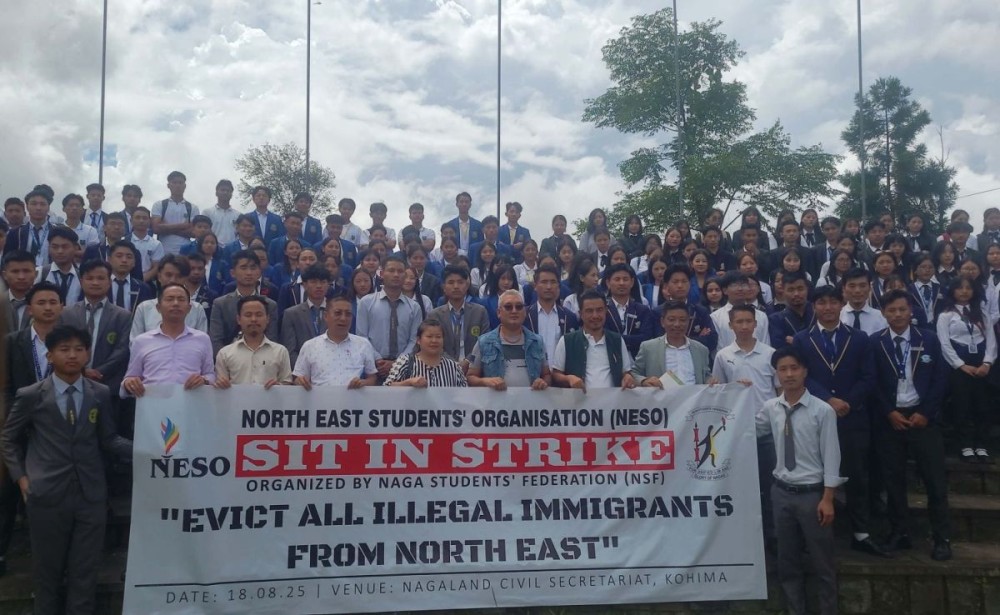
NESO, NSF stages ‘sit-in- strike’, demands eviction of illegal immigrants
Our Correspondent
Kohima | August 18
Responding to the call of the North East Students’ Organization (NESO), the Naga Students’ Federation (NSF) today staged a peaceful ‘Sit-in-Strike,’ demanding eviction of illegal immigrants from the North East.
Addressing the peaceful protest billed as “Evict all illegal immigrants from North East” at the Naga Solidarity Park, NESO Secretary General Mutsikhoyo Yhobu urged the state government to work with bodies like the NSF and tribal apex bodies to prevent, detect and deport illegal immigrants.
On behalf of the NESO, he urged the Nagaland state government, and all the north eastern states to implement strict measures in compliance with the Home Ministry’s directive, and also appealed the Government of India to permanently seal the Indo- Bangladesh border.
“Let us stand together in unity to protect our land, our rights and secure our future,” Yhobu said.
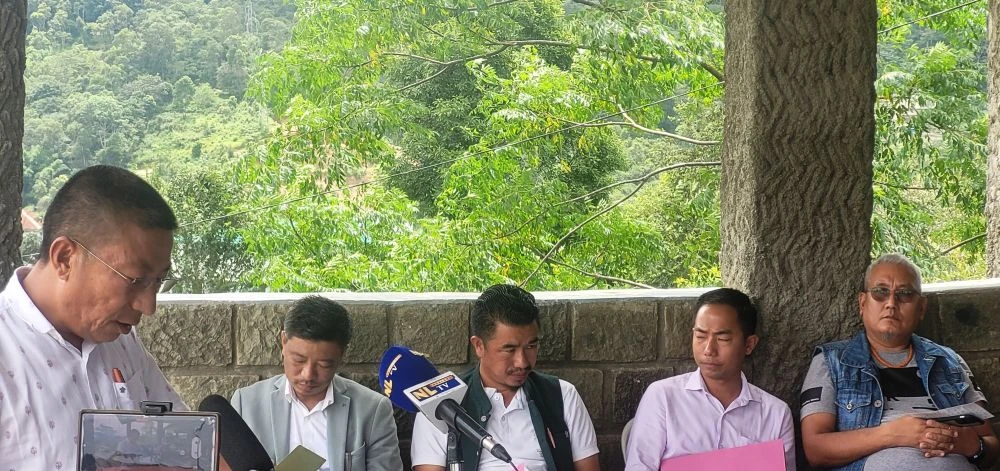
He said that influx of illegal immigrants affects not only today’s generation but also the future of the indigenous people of the region.
Stating that NESO has been committed to finding a concrete solution to safeguard the future of the North east and its people, Yhobu appreciated the decision taken by the Nagaland state government in extending the Inner Line Permit (ILP) to the entire state.
According to him, the NSF, since its inception, has been advocating for this issue through successive tenures, submitting several research papers to the state government, and setting up an independent Inner Line Regulation Commission.
He said that the NSF Inner Line Regulation Commission has already submitted a representation to the state government, advocating for the ILP to revert to its original system, which should be “a pass, not a permit.”
“However, we must understand that ILP is not the driving tool for addressing the issue of illegal immigrants. There is a crucial difference between ILP and illegal immigrants. ILP is for every outsider who wants to come to the state. They can come by applying ILP and they will go back,” Yhobu said.
‘ILP only a pass’
Former NSF General Secretary K Elu Ndang held that there is no proper mechanism to address the issue of illegal immigrants and urged the government to come up with stringent measures.
“This illegal immigrant issue is much more serious than diseases like cancer. The future generation will be submerged if we don’t wake up today,” Ndang said.
“ILP is not a permit. It is only a pass. Once your purpose is served, you have to go back. But today, it looks like ILP is a permit, to go for business, for sustenance, for survival for those illegal migrants,” he alleged.
Also addressing the gathering, NSF President Medovi Rhi said, “We are very serious when it comes to issue of illegal immigrants.” He declared that the NSF is not against citizens of India visiting the state “but we are against illegal immigrants.”
Later, NESO and NSF officials submitted a memorandum to the Chief Minister of Nagaland through Chief Minister’s Office, Kohima.
Memorandum
The memorandum, signed by NESO chairman Samuel B Jyrwa and Secretary General Mutsikhoyo Yhobu, demanded sealing of the Indo-Bangla border and also urged the state governments to strengthen border control and monitoring, particularly in vulnerable areas, by deploying adequate security personnel and modern surveillance technology.
NESO called for stronger coordination among the North-east states and relevant agencies to ensure that illegal immigrants are not simply relocated within the region when detected.
Further, it urged to preserve and protect indigenous rights, cultures, languages, political and land ownership through appropriate legal safeguards and policy measures, and also to set up a Special Review Committee to address alleged population explosion in certain areas.
Further, NESO urged the Government of India (GoI) and all concerned state governments to treat this issue with the seriousness and urgency it demands.
“The demographic and cultural changes already visible in parts of our region are warnings of an existential crisis. If strong and sustained measures are not taken now, the very identity of the North East’s indigenous peoples could be irreversibly altered,” it stated.
NESO expressed deep concern and made an urgent appeal regarding the long-standing, unaddressed, and escalating issue of illegal migration into the North East region.
For decades, the North East has been grappling with the challenge of uncontrolled and unchecked influx of illegal migrants, stated NESO.
This problem began soon after India attained Independence in 1947 and has, over time, grown into one of the most pressing threats to the socio-cultural fabric, demographic balance, and political stability of our states, NESO stated.
It said that the consequences have been devastating. Tripura was cited as an example where, it said, the threat has been most alarming. It added that Assam too has suffered immensely, leading to the historic six-year-long anti-foreigners’ movement that culminated in the signing of the Assam Accord in 1985. Despite the sacrifices and struggles of countless individuals, the promises of this accord have not been fully realised, and illegal migration continues unabated, NESO stated.
NESO stated that Meghalaya has faced repeated waves of agitation— in 1979, 1987, and the early 1990s — all triggered by the fear of demographic displacement and the erosion of indigenous rights.
Today, NESO stated the problem has only deepened. The alleged shift in demographics is not confined to one state alone, but has spilled over to other states of the region, it held.
It said that the NESO has repeatedly placed the issue before the GoI, urging for concrete and sustained measures. Unfortunately, it held that the responses have been inadequate, often limited to temporary or reactionary steps rather than comprehensive, long-term solutions.
The alleged absence of decisive action has left the indigenous peoples vulnerable, and in many cases, reportedly forced to fend for themselves in protecting their rights, culture, and identity. But, it said that the NESO remains committed to continuing its engagement with the GoI for a concrete and decisive solution to safeguard the future of the North East and its people.
“We wish to stress that this is not merely a political or administrative issue— it is a matter of survival for the indigenous communities of the North East. Our languages, our traditions, our cultural practices, and our very existence as distinct peoples are at stake,” NESO stated in its memorandum.
“States where the Bengal Eastern Frontier Regulation, 1873, is not applicable are especially susceptible to infiltration and must adopt robust mechanisms for prevention, detection, and deportation of illegal migrants. Border management, inter-state coordination, and local vigilance must be strengthened without delay,” it stated..


